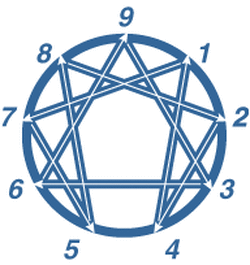What is the Enneagram?
It is all of us, together.
Many people find that understanding personality type helps them navigate life with greater ease. A sophisticated and powerful ancient system for self-understanding and personal development, the Enneagram is used worldwide as an effective tool in spirituality, psychology, and business.
The Enneagram reveals that all people belong to one of nine major personality types. The purpose of the Enneagram is not to put you into a box, but to help you identify both the strengths and the limitations of a preferred strategy and to give you guidance on how you may develop more capacity beyond it. And of course it is a tool for understanding others too.
The Enneagram offers a roadmap to address the specific challenges of each personality type and to develop the unique virtues of that type that are waiting to be discovered. Support for better relationships and communication is a focus of the system, because discovering the “lens” through which we view the world is the first step in our comprehending how others may experience the world differently. Just a basic understanding of the Nine Points of View broadens your skill in communicating with others, be it in your personal or your professional life.
Here is a bibliography to get you started. Some people find that individual spiritual direction, mentoring or a focused-learning session with specialist Dale Rhodes helps get to the depth of exploring their own Enneagram type, or the types of their own couple. Some also find that groups and workshops support learning the system to its fullest capacity. Both options highlight the potential for growth in self-development, intimate relationships, spirituality and worklife. People from all walks of life find the offerings to be educational, transformative and great fun.
The Enneagram reveals that all people belong to one of nine major personality types. The purpose of the Enneagram is not to put you into a box, but to help you identify both the strengths and the limitations of a preferred strategy and to give you guidance on how you may develop more capacity beyond it. And of course it is a tool for understanding others too.
The Enneagram offers a roadmap to address the specific challenges of each personality type and to develop the unique virtues of that type that are waiting to be discovered. Support for better relationships and communication is a focus of the system, because discovering the “lens” through which we view the world is the first step in our comprehending how others may experience the world differently. Just a basic understanding of the Nine Points of View broadens your skill in communicating with others, be it in your personal or your professional life.
Here is a bibliography to get you started. Some people find that individual spiritual direction, mentoring or a focused-learning session with specialist Dale Rhodes helps get to the depth of exploring their own Enneagram type, or the types of their own couple. Some also find that groups and workshops support learning the system to its fullest capacity. Both options highlight the potential for growth in self-development, intimate relationships, spirituality and worklife. People from all walks of life find the offerings to be educational, transformative and great fun.
Meet the Enneagram Types in Portland.
1 Idealist: attention to error and standards.
2 Connector: attention to need and connecting.
3 Performer: attention to tasks.
4 Romantic: attention to what is missing.
5 Observer: attention to conserving energy.
6 Loyal Skeptic: attention to worst cases.
7 Epicure: attention to options and freedom.
8 Protector: attention to force and injustice.
9 Mediator: attention to comfort, harmony, union.
1 Idealist: attention to error and standards.
2 Connector: attention to need and connecting.
3 Performer: attention to tasks.
4 Romantic: attention to what is missing.
5 Observer: attention to conserving energy.
6 Loyal Skeptic: attention to worst cases.
7 Epicure: attention to options and freedom.
8 Protector: attention to force and injustice.
9 Mediator: attention to comfort, harmony, union.
“It is so much easier to rest contented with what we have already acquired than to change ever so slightly those routine but profound habits of thought and feeling which govern our life, and by which we live so blissfully. This mental inertia is, perhaps, our greatest enemy. Insidiously it leads us to assume that we can renew our lives without renewing our habits.”
---Nadia Boulanger (composer, theorist, teacher) 1925
---Nadia Boulanger (composer, theorist, teacher) 1925

